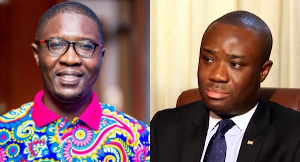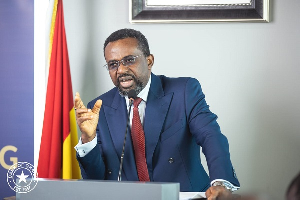Artificial Intelligence (AI) is emerging as one of the most transformative technologies of the 21st century. Its applications are reshaping industries, improving efficiencies, and solving industry problems across various sectors, from healthcare to agriculture.
In Ghana, the field of applied AI is experiencing significant growth, with universities and research institutions taking the lead in training the next generation of AI experts. The contributions of these experts, particularly those at the universities level, are positioning Ghana as a prominent player in the global AI landscape.
The Rise of AI in Ghana
In recent years, Ghana has seen a remarkable surge in interest and investment in AI and data science. This growth is fueled by the increasing recognition of AI's potential to address local challenges and propel economic development.
AI technologies have found applications in diverse sectors such as healthcare, agriculture, education, and finance. The country's rapidly expanding tech ecosystem, supported by both local and international initiatives, is creating a fertile ground for innovation in AI.
Ghana’s universities have played a pivotal role in this transformation. Institutions like the University of Ghana, Kwame Nkrumah University of Science and Technology (KNUST), and the African Institute for Mathematical Sciences (AIMS) have promoted research and development in AI by offering specialized programs and research opportunities in machine learning, data science, and artificial intelligence.
Contributions of Ghanaian Researchers in Data Science and AI
Several Ghanaian researchers are at the forefront of AI research, making significant contributions to both local and global knowledge in the field. Their research, ranging from developing machine learning models for practical applications, responsible AI to studying ethical concerns in AI, is positioning Ghana as a key player in the AI revolution. Some Ghanaian researchers making exceptional impact in the field are listed below:
Dr. Moustapha Cissé: A Global Leader in AI
Dr. Moustapha Cissé, a renowned AI researcher, exemplifies the high caliber of talent emerging from Ghana. He serves as the Head of the Google AI Center in Accra, Ghana, and is a professor at the African Institute for Mathematical Sciences (AIMS).
Dr. Cissé’s work focuses on machine learning, AI applications in societal challenges, and building AI education infrastructure in Africa. He is the founder of the African Master’s in Machine Intelligence (AMMI), a program that trains young African researchers in advanced AI techniques.
His impact in the field is widely recognized globally, with numerous research papers and contributions to AI education. Cissé's work has earned him accolades, and his influence in AI research in Africa cannot be overstated. His ability to bridge the gap between cutting-edge AI research and practical applications has made him a sought-after expert in the field.
Prof. Jerry John Kponyo: Championing Responsible AI
Professor Jerry John Kponyo, the Principal Investigator and Scientific Director of the Responsible AI Lab (RAIL) at KNUST, is another leading figure in Ghana’s AI ecosystem. His research focuses on the ethical and responsible use of AI, a critical area as AI continues to shape human society. His work on ensuring fairness, accountability, and transparency in AI systems is pivotal in a world that increasingly relies on these technologies.
Under his leadership, the Responsible AI Lab has become a key institution for AI research in Ghana, organizing significant events such as the Ghana Data Science Summit. These events aim to promote responsible AI development and raise awareness of its societal implications.
Dr. James Dzisi Gadze: Advancing AI in Cybersecurity
Dr. James Dzisi Gadze, a researcher at the Data Science, Computational Intelligence, and Cybersecurity Lab (DCIC-LAB) at KNUST, is working on applying AI to address cybersecurity challenges. His research aims to use machine learning and deep learning models to predict, detect, and mitigate cybersecurity threats. Given the increasing digitalization in Africa, his work is especially important in securing critical infrastructure against cyber-attacks.
Dr. Gadze’s contributions to the field of cybersecurity are advancing both the practical and theoretical aspects of machine learning in security systems. His research helps bridge the gap between AI and practical solutions for safeguarding digital spaces.
Kwabena Odame Akomeah, an Emerging Researcher in AI and Data Science
Kwabena Odame Akomeah, a PhD candidate in Informatics at the University of Regensburg, Germany, is one of the brightest emerging AI researchers in Ghana. His research focuses on Hate Speech Detection beyond Plain Natural Language Processing (NLP), exploring innovative methods to identify and classify harmful content in digital spaces. Akomeah’s research is particularly relevant in today's increasingly polarized digital environments, where detecting and mitigating hate speech is a pressing challenge.
Kwame’s work has already resulted in four peer-reviewed publications, some of which have been presented at prestigious conferences like GermEval and the European Summer School for Information Retrieval (ESSIR). Notably, his paper titled "University of Regensburg@ PAN: Profiling Hate Speech Spreaders on Twitter" has drawn significant attention for its novel approach to profiling and identifying hate speech spreaders on social media platforms.
Kwame's research publications are having a measurable impact in the field. His contributions are enhancing the understanding of NLP techniques and expanding the scope of AI’s application in the ethical and responsible monitoring of digital communication. With a growing citation count and increasing recognition in international AI circles, Kwame is well on his way to becoming a top expert in AI and NLP.
Kwabena Odame Akomeah is a Rising Influence
Kwabena Odame Akomeah’s research in hate speech detection represents a critical area of AI application. His approach goes beyond traditional NLP techniques by integrating ensemble-based classification models and exploring nuanced aspects of toxicity and engagement in digital communication. This is an area of AI that has immediate real-world implications, especially in social media moderation and the fight against online hate speech.
Akomeah’s work stands out for its interdisciplinary nature, drawing on linguistics, computer science, and ethics. His research papers, such as "UR@NLP_A_Team @ GermEval 2021: Ensemble-based Classification of Toxic, Engaging, and Fact-Claiming Comments" and "Team Quabynar at the GermEval 2024 Shared Task 1 GerMS-Detect on Sexism Detection," are shaping the conversation around AI-driven content moderation and providing insights into the complexity of online discourse.
Akomeah's ability to combine advanced machine learning techniques with real-world challenges has placed him in the spotlight. His work is not only contributing to academic discourse but also has practical implications for organizations and platforms seeking to implement AI solutions for content moderation.
Global Recognition and Impact of Ghanaian AI Researchers
The impact of AI research by Ghanaian experts is reflected in the growing citations of their work. For instance, Dr. Moustapha Cissé’s work has been widely cited in the AI community, with his contributions in machine learning applications and AI education having a significant global footprint. Similarly, researchers like Prof. Jerry John Kponyo and Dr. James Dzisi Gadze have earned recognition for their focus on responsible AI and cybersecurity.
Kwabena Odame Akomeah’s publications, though still emerging, are already starting to gain significant attention within the academic community. His citation count is poised to grow rapidly as his work continues to influence the development of AI tools for digital content analysis.
The Future of AI in Ghana
The growth of applied AI in Ghana is a testament to the dedication and innovation of its researchers, both established and emerging. Experts like Dr. Moustapha Cissé, Prof. Jerry John Kponyo, and Dr. James Dzisi Gadze are paving the way for the country to become a hub for AI innovation. Meanwhile, PhD candidates like Kwabena Odame Akomeah are proving that Ghana's young researchers are making meaningful contributions to global AI advancements.
As AI continues to evolve, Ghana’s researchers will play an increasingly important role in shaping the future of technology and its impact on society. The ongoing research in AI, particularly in areas like hate speech detection, cybersecurity, and responsible AI, is poised to have a lasting impact, not only in Ghana but across the globe.
Kwame’s work, coupled with the contributions of other Ghanaian researchers, is positioning the country at the forefront of AI innovation, with the potential to solve local and global challenges alike. The future of AI in Ghana is bright, and the contributions of these experts are a driving force behind this growth.
Opinions of Friday, 27 December 2024
Columnist: Maame Serwaa Agyei Darkwah















